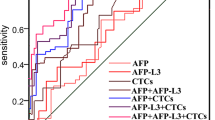Abstract
Background
The aim of this study was to determine the role of Lens culinaris agglutinin-reactive fraction of alpha-fetoprotein (AFP-L3) as a prognostic marker and a monitor marker of recurrence after curative resection of hepatocellular carcinoma (HCC).
Methods
From December 2002 to May 2004, 395 consecutive patients with HCC who underwent curative partial hepatectomy were included in the study. The tumor characteristics and clinical outcomes of patients with positive preoperative and postoperative AFP-L3 were compared with those with negative results.
Results
A high ratio of AFP-L3 to total AFP was an indicator of pathologic aggressiveness. Patients with positive preoperative AFP-L3 had significantly earlier recurrence (median time to recurrence 22.0 ± 2.4 months vs 45.0 ± 6.9 months, P < .001) when compared with those with negative preoperative results. Significantly more patients with continuously positive or negative-turn-positive AFP-L3 results after surgery developed recurrence, particularly distant metastases, when compared with patients with continuously negative AFP-L3 results. The overall and disease-free survivals were significantly shorter in the positive than the negative preoperative AFP-L3 group. The overall and disease-free survivals were significantly shorter in the continuously positive and the negative-turn-positive than the continuously negative postoperative AFP-L3 group.
Conclusion
Positive preoperative AFP-L3 and continuously positive or negative-turn-positive AFP-L3 results after surgery predicted a more aggressive tumor behavior, higher tumor recurrence, and poorer clinical outcomes. HCC patients with an increased proportion of AFP-L3 to total AFP should be more aggressively treated and closely followed-up.


Similar content being viewed by others
References
Lau WY. Management of hepatocellular carcinoma. J R Coll Surg Edinb. 2002;47:389–99.
Lai EC, Lau WY. The continuing challenge of hepatic cancer in Asia. Surgeon. 2005;3:210–5.
Lau WY. Primary hepatocellular carcinoma. In: Blumgart LH, Fong Y, eds. Surgery of the liver and biliary tract. Vol. 2. London: WB Saunders; 2000. p. 1423–50.
Liaw YF, Tai DI, Chu CM, Lin DY, Sheen IS, Chen TJ, et al. Early detection of hepatocellular carcinoma in patients with chronic type B hepatitis: a prospective study. Gastroenterology. 1986;90:263–7.
Debruyne EN, Delanghe JR. Diagnosing and monitoring hepatocellular carcinoma with alpha-fetoprotein: new aspects and applications. Clin Chim Acta. 2008;395:19–26.
Oka H, Tamori A, Kuroki T, Kobayashi K, Yamamoto S. Prospective study of alpha-fetoprotein in cirrhotic patients monitored for development of hepatocellular carcinoma. Hepatology. 1994;19:61–6.
Chu CW, Hwang SJ, Luo JC, Lai CR, Tsay SH, Li CP, et al. Clinical, virologic, and pathologic significance of elevated serum alpha-fetoprotein levels in patients with chronic hepatitis C. J Clin Gastroenterol. 2001;32:240–4.
Farinati F, Marino D, De Giorgio M, Baldan A, Cantarini M, Cursaro C, et al. Diagnostic and prognostic role of alpha-fetoprotein in hepatocellular carcinoma: both or neither? Am J Gastroenterol. 2006;101:524–32.
Paul SB, Gulati MS, Sreenivas V, Madan K, Gupta AK, Mukhopadhyay S, et al. Evaluating patients with cirrhosis for hepatocellular carcinoma: value of clinical symptomatology, imaging and alpha-fetoprotein. Oncology. 2007;72:S117–23.
Li D, Mallory T, Satomura S. AFP-L3: a new generation of tumor marker for hepatocellular carcinoma. Clin Chim Acta. 2001;313:15–9.
Sato Y, Nakata K, Kato Y, Shima M, Ishii N, Koji T, et al. Early recognition of hepatocellular carcinoma based on altered profiles of alpha-fetoprotein. N Engl J Med. 1993;328:1802–6.
Taketa K, Endo Y, Sekiya C, Tanikawa K, Koji T, Taga H, et al. A collaborative study for the evaluation of lectin-reactive alpha-fetoproteins in early detection of hepatocellular carcinoma. Cancer Res. 1993;53:5419–23.
Marrero JA, Feng Z, Wang Y, Nguyen MH, Befeler AS, Roberts LR, et al. Alpha-fetoprotein, des-gamma carboxyprothrombin, and lectin-bound alpha-fetoprotein in early hepatocellular carcinoma. Gastroenterology. 2009;137:110–8.
Yamashita F, Tanaka M, Satomura S, Tanikawa K. Prognostic significance of Lens culinaris agglutinin A-reactive alpha-fetoprotein in small hepatocellular carcinomas. Gastroenterology. 1996;111:996–1001.
Yamashiki N, Seki T, Wakabayashi M, Nakagawa T, Imamura M, Tamai T, et al. Usefulness of Lens culinaris agglutinin A-reactive fraction of alpha-fetoprotein (AFP-L3) as a marker of distant metastasis from hepatocellular carcinoma. Oncol Rep. 1999;6:1229–32.
Hayashi K, Kumada T, Nakano S, Takeda I, Sugiyama K, Kiriyama S, et al. Usefulness of measurement of Lens culinaris agglutinin-reactive fraction of alpha-fetoprotein as a marker of prognosis and recurrence of small hepatocellular carcinoma. Am J Gastroenterol. 1999;94:3028–33.
Tateishi R, Shiina S, Yoshida H, Teratani T, Obi S, Yamashiki N, et al. Prediction of recurrence of hepatocellular carcinoma after curative ablation using three tumor markers. Hepatology. 2006;44:1518–27.
Tada T, Kumada T, Toyoda H, Kiriyama S, Sone Y, Tanikawa M, et al. Relationship between Lens culinaris agglutinin-reactive alpha-fetoprotein and pathologic features of hepatocellular carcinoma. Liver Int. 2005;25:848–53.
Miyaaki H, Nakashima O, Kurogi M, Eguchi K, Kojiro M. Lens culinaris agglutinin-reactive alpha-fetoprotein and protein induced by vitamin K absence II are potential indicators of a poor prognosis: a histopathological study of surgically resected hepatocellular carcinoma. J Gastroenterol. 2007;42:962–8.
Shiraki K, Takase K, Tameda Y, Hamada M, Kosaka Y, Nakano T. A clinical study of lectin-reactive alpha-fetoprotein as an early indicator of hepatocellular carcinoma in the follow-up of cirrhotic patients. Hepatology. 1995;22:802–7.
Kobayashi M, Kuroiwa T, Suda T, Tamura Y, Kawai H, Igarashi M, et al. Fucosylated fraction of alpha-fetoprotein, L3, as a useful prognostic factor in patients with hepatocellular carcinoma with special reference to low concentrations of serum alpha-fetoprotein. Hepatol Res. 2007;37:914–22.
Lau WY, Lai EC. The current role of radiofrequency ablation in the management of hepatocellular carcinoma: a systematic review. Ann Surg. 2009;249:20–5.
Jonas S, Steinmüller T, Settmacher U, Langrehr J, Müller A, Neuhaus P. Liver transplantation for recurrent hepatocellular carcinoma in Europe. J Hepatobiliary Pancreat Surg. 2001;8:422–6.
Dalton RR, Eisenberg BL. Surgical management of recurrent liver tumors. Semin Oncol. 1993;20:493–505.
Acknowledgement
Funding Supported by the National High Technology Research and Development Program of China (No. 2007AA02Z461), China National Key Projects for Infectious Disease (No. 2008ZX10002-021), and the National Natural Science Foundation of China (No. 30772513).
Author information
Authors and Affiliations
Corresponding author
Rights and permissions
About this article
Cite this article
Zhang, XF., Lai, E.C.H., Kang, XY. et al. Lens Culinaris Agglutinin-Reactive Fraction of Alpha-Fetoprotein as a Marker of Prognosis and a Monitor of Recurrence of Hepatocellular Carcinoma After Curative Liver Resection. Ann Surg Oncol 18, 2218–2223 (2011). https://doi.org/10.1245/s10434-011-1613-7
Received:
Published:
Issue Date:
DOI: https://doi.org/10.1245/s10434-011-1613-7




